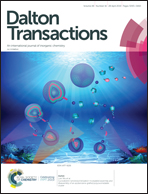Encapsulation condition dependent photophysical properties of polypyridyl Ru(ii) complexes within a hydrogen-bonded capsule†
Abstract
Controlling the encapsulation equilibrium is a key strategy to affect host–guest associations. Ruthenium(II) polypyridyl complex salts suspended in a chloroform solution of resorcin[4]arene afforded a host–guest complex which showed structured emission spectra even in the solution state. In contrast, a host–guest complex obtained through homogeneous encapsulation conditions by using soluble ruthenium(II) polypyridyl complex salts showed broadened emission spectra which strongly depended on the amount of the host owing to the encapsulation equilibrium. These results demonstrate that a simple modulation of the encapsulation technique is indeed promising and a facile approach to control the photophysical properties of supramolecular complexes.



 Please wait while we load your content...
Please wait while we load your content...